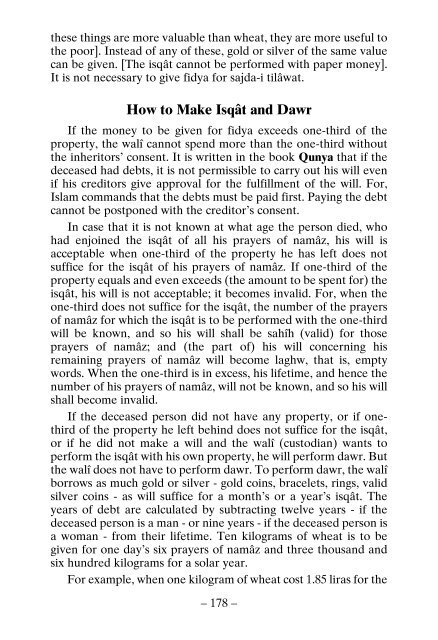Book of Namaz
You also want an ePaper? Increase the reach of your titles
YUMPU automatically turns print PDFs into web optimized ePapers that Google loves.
these things are more valuable than wheat, they are more useful to<br />
the poor]. Instead <strong>of</strong> any <strong>of</strong> these, gold or silver <strong>of</strong> the same value<br />
can be given. [The isqât cannot be performed with paper money].<br />
It is not necessary to give fidya for sajda-i tilâwat.<br />
How to Make Isqât and Dawr<br />
If the money to be given for fidya exceeds one-third <strong>of</strong> the<br />
property, the walî cannot spend more than the one-third without<br />
the inheritors’ consent. It is written in the book Qunya that if the<br />
deceased had debts, it is not permissible to carry out his will even<br />
if his creditors give approval for the fulfillment <strong>of</strong> the will. For,<br />
Islam commands that the debts must be paid first. Paying the debt<br />
cannot be postponed with the creditor’s consent.<br />
In case that it is not known at what age the person died, who<br />
had enjoined the isqât <strong>of</strong> all his prayers <strong>of</strong> namâz, his will is<br />
acceptable when one-third <strong>of</strong> the property he has left does not<br />
suffice for the isqât <strong>of</strong> his prayers <strong>of</strong> namâz. If one-third <strong>of</strong> the<br />
property equals and even exceeds (the amount to be spent for) the<br />
isqât, his will is not acceptable; it becomes invalid. For, when the<br />
one-third does not suffice for the isqât, the number <strong>of</strong> the prayers<br />
<strong>of</strong> namâz for which the isqât is to be performed with the one-third<br />
will be known, and so his will shall be sahîh (valid) for those<br />
prayers <strong>of</strong> namâz; and (the part <strong>of</strong>) his will concerning his<br />
remaining prayers <strong>of</strong> namâz will become laghw, that is, empty<br />
words. When the one-third is in excess, his lifetime, and hence the<br />
number <strong>of</strong> his prayers <strong>of</strong> namâz, will not be known, and so his will<br />
shall become invalid.<br />
If the deceased person did not have any property, or if onethird<br />
<strong>of</strong> the property he left behind does not suffice for the isqât,<br />
or if he did not make a will and the walî (custodian) wants to<br />
perform the isqât with his own property, he will perform dawr. But<br />
the walî does not have to perform dawr. To perform dawr, the walî<br />
borrows as much gold or silver - gold coins, bracelets, rings, valid<br />
silver coins - as will suffice for a month’s or a year’s isqât. The<br />
years <strong>of</strong> debt are calculated by subtracting twelve years - if the<br />
deceased person is a man - or nine years - if the deceased person is<br />
a woman - from their lifetime. Ten kilograms <strong>of</strong> wheat is to be<br />
given for one day’s six prayers <strong>of</strong> namâz and three thousand and<br />
six hundred kilograms for a solar year.<br />
For example, when one kilogram <strong>of</strong> wheat cost 1.85 liras for the<br />
– 178 –

















